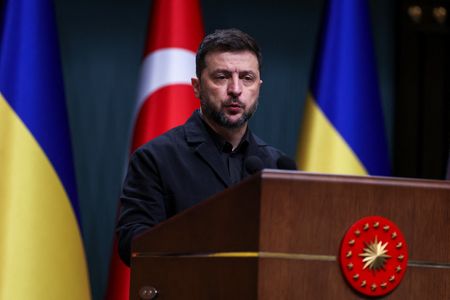KYIV (Reuters) -Ukraine’s government plans to appoint a new supervisory board at Energoatom, the state nuclear company at the heart of a corruption scandal, by the end of this year, Economy Minister Oleksiy Sobolev said on Friday.
Ukraine has been rocked by a scandal over an alleged $100 million kickback scheme involving senior energy officials and a former business associate of President Volodymyr Zelenskiy.
It is the country’s biggest corruption scandal since Zelenskiy became president in 2019 on a mandate to eliminate graft.
“We need to restore management and proper functioning of all bodies at Energoatom to restore trust,” Sobolev told reporters.
Anti-corruption authorities have stepped up their fight against graft since Russia’s full-scale invasion in 2022, aiming to reassure donors and prove that Kyiv is ready for membership in the European Union. But that has meant painful public revelations of high-level sleaze that has long plagued Ukraine.
The government dismissed Energoatom’s supervisory board earlier this month after an investigation was launched into alleged corrupt activity. All company officials involved in the investigation were suspended. Energoatom has said it is cooperating with authorities and committed to transparency.
The scandal is unfolding amid escalating Russian attacks on Ukrainian energy facilities, including substations that supply electricity to nuclear power plants. As the war with Russia approaches its four-year mark, millions of Ukrainians face long power cuts.
Energoatom runs three nuclear power plants, which supply Ukraine with more than half of its electricity. It has said the investigation has no impact on production or safety.
Sobolev said the new supervisory board would comprise seven members, three representing the government and four independent.
He said the government was strengthening the recruitment process, including demanding more qualifications, and that a large pool of candidates had been identified.
(Reporting by Olena Harmash. Editing by Mark Potter)









